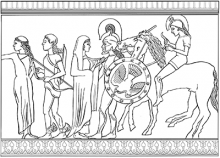
You are here
Episode 7: Triumph for the Trojans?
Story summary
Teaching activities
- Starting points
- Follow-up
- Further activities
-
Ask the class to tell you about the progress of the war so far. Ask for a brief resumé of Achilles’ story. Who has intervened to help? (Thetis and Zeus who has acted on her request.)
-
Do the learners feel the tension is mounting, that something awful is going to happen? If so, why?
-
Ask them to think back to when Zeus got involved. Is this significant? How did Hera know Thetis had visited Zeus? (She smelt fish.) How do we know Hera doesn’t like her? (She referred to her impersonally as “that Thetis”.) What is her reason? (Zeus once desired Thetis.)
-
Show the class the illustration,
![[pdf] [pdf]](/sites/default/files/pdf_icon.png) Hector and Andromache. What does the arrangement of the figures (Helen and Paris on the left; Andromache and Hector in the middle; Hector’s servant on the right) tell us about the character of Hector? (Hector and Andromache centre stage, looking fondly into each other’s eyes; Hector’s fighting prowess emphasised by the massive shield.) Who is missing from the scene as described in the story? (Hector and Andomache’s son, Astyanax.) Why do you think he has been left out?
Hector and Andromache. What does the arrangement of the figures (Helen and Paris on the left; Andromache and Hector in the middle; Hector’s servant on the right) tell us about the character of Hector? (Hector and Andromache centre stage, looking fondly into each other’s eyes; Hector’s fighting prowess emphasised by the massive shield.) Who is missing from the scene as described in the story? (Hector and Andomache’s son, Astyanax.) Why do you think he has been left out? -
What do they think of Hector, prince of Troy? How is he similar or dissimilar to Achilles? To Menelaus? To Agamemnon? Try to elicit responses that refer to Hector’s qualities as a son and father. Would a good husband tell his wife that he is married to the land as well as to her? What does he mean? Should Hector have stayed with his family or fought to protect his city? Hector is seen as a family man. Does that alter the way we think about him?
-
Andromache is desperate to keep Hector away from Achilles. What is her reason? What does she call Achilles? (“A wild animal”, because her parents and all seven brothers were killed by Achilles.) Earlier he was referred to as a caged animal. Do they remember when? (At the beginning of Episode 6, when Achilles was frustrated by the Trojans’ withdrawal into Troy and refusal to fight.)
-
The battle is vividly described and we are told that the Trojans behaved disgracefully. Give examples of Trojan behaviour the Greeks thought unacceptable. (They kicked burial mounds; gutted the Greek wounded; threw spears at the backs of their enemies.)
-
In this episode we see the battle between the two armies clearly from both points of view. How was the destruction of the palisade described? (A sandcastle kicked by a child, as if a god had stomped on it.) The victory of the Trojans is described triumphantly but the defeat of the Greeks is described as horrific. Why are they described so differently? This is an opportunity to discuss propaganda; how different viewpoints that mean the same outcome can seem different; how both descriptions might contain elements of the truth.
-
Ask learners to imagine they have witnessed the battle and are writing a media report of the event. They must choose which side they are on, or ‘no side’: but must not disclose this to the others. Learners guess the different allegiances when reports are read out.
-
Hera tricks Zeus into sleep and then visits Patroclus. What has made her invisible? (Aphrodite’s girdle of love and desire.) What does she do? (She fills Patroclus with courage so he puts on the armour of Achilles.) Ask for a detailed description of this armour.
-
What does Achilles keep for Patroclus until he returns? (The ring Achilles had given him.) Who first gave that ring to Achilles? (It was given to him by Thetis who had been given it as a wedding present by Aphrodite.)
Is there a “proper” way to fight a war? The Greeks thought the Trojans had behaved badly. They had broken the rules of warfare. How do learners feel about this?
Visual aids
Hector and Andromache
Based on a Chalcidian vase, 550-530 BC. Martin von Wagner Museum der Universität Würzburg.
On the original vase the names of all the figures are written beside them. From the left they are Helen, Paris, Andromache, Hector and Cebriones (Hector’s attendant). Hector’s stature as a fighter is emphasised by his helmet and prominent shield, and in contrast to Helen and Paris, Hector and Andromache look each other full in the face. Noticeably absent from this painting of the scene is the baby Astyanax, who burst into tears at the sight of his father’s plumed helmet.
